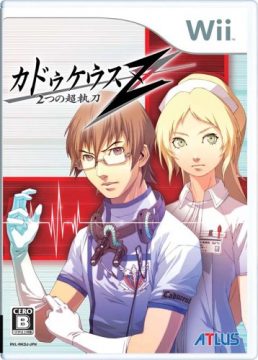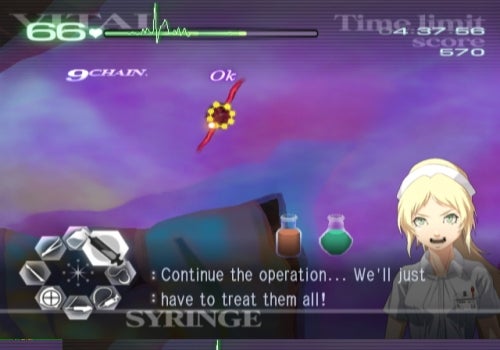
You gain evidence through multiple techniques, such as examining corpses and their personal effects, reviewing witness testimony and investigating crime scenes. As you collect evidence it is recorded in cards, which you combine to establish connections between murder weapons, suspects and the like. However it’s much more serious than the DS’s goofy lawyer sims. The forensics track is the most like a traditional visual novel and reminded me of Phoenix Wright a bit. After being diagnosed with a terminal illness, Naomi gave up surgery to become a medical examiner. The enigmatic Naomi Kimishima makes a return to handle forensics. The new perspective makes the standard tools and procedures feel fresh and challenging, even for a longtime player like me. While you’re exploring you’ll do familiar tasks like draining blood and injecting medicine, but you have some new tools like haemostatic forceps for cauterizing hemorrhages and a cable loop to clip out those pesky polyps and tumors. It really feels like you’re feeding a cable deeper into someone’s guts. As wayward Japanese heiress Tomoe Tachibana, you’ll be threading an endoscope through a patient’s viscera with Wii remote gestures. There’s no time limit, so orthopedics is very much a Zen experience and a nice change of pace from the frantic surgery and first response.Įndoscopy has some similarities to surgery but has a more three-dimensional feel. Once the pieces have been reassembled, you have to drill guidelines and then fasten the bone back together with plates.Bigger fragments like joints and sockets have to be held together with pins, which you hammer in with precise gesture taps. Shattered bones must be reassembled piece by piece, and any missing fragments must be carved out of synthetic bone with a laser.

There have been occasional orthopedic operations in past Trauma Center titles but nothing on the level of depth or realism in Trauma Team. You guide the hands of gentle giant Hank Freebird, an Army Ranger veteran with some lingering guilt about his previous profession. In contrast, orthopedics is all about slow, steady precision. It’s much more hectic than surgery and makes you think on your feet. It’s a juggling act, requiring that you move back and forth between multiple patients, assessing which ones are in the worst condition and dragging them out of the jaws of death.

CPR and defibrillators are used much more often than in surgery, and you’ll often have to intubate to secure an airway-you didn’t think you’d get out of first response without performing a makeshift tracheotomy, did you?įirst response is all about getting patients stable so expect to be using splints, bandaged, tourniquets and blood transfusion IVs. Blood must be soaked up with gauze rather than sucked out of wounds with a drain, and you can’t use sutures outside of a sterile operating room so you have to seal injuries with trauma pads and medical tape. The gameplay here has many similarities to standard surgery but with several distinct differences and new procedures. In first response you play as the fiery and short-tempered Maria Torres. Atlus has gotten this part of the game down to a science (no pun intended) so they’ve fixed a lot of the nagging balance and precision issues. While a lot of CR-S01’s gameplay is reminiscent of earlier games it’s been refined to near-perfection in Trauma Team.

You’ll be excising tumors, suturing weak heart walls and treating third-degree burns. As CR-S01 works off his sentence bit-by-bit through high-risk operations, his track plays like a highlights reel of the previous Trauma Center games. That’s his prison number the surgeon is an amnesiac inmate who has been accused of a bioterrorism attack and slapped with a 250-year sentence. The most familiar field will be emergency surgery, performed by the mysterious CR-S01. Each doctor has six or seven operations, for a total of over forty missions in the game. Each field focuses on a different specialist, which is a more realistic setup than the Derek Stiles master-of-all whiz kid premise from the past.
#Trauma center second opinion force progressive scan series#
If you’ve been following the game’s rather public development through Atlus’s series of dev diaries, you know that Trauma Team adds five medical disciplines to the standard surgery: first response, orthopedics, endoscopy, diagnostics and forensics.


 0 kommentar(er)
0 kommentar(er)
